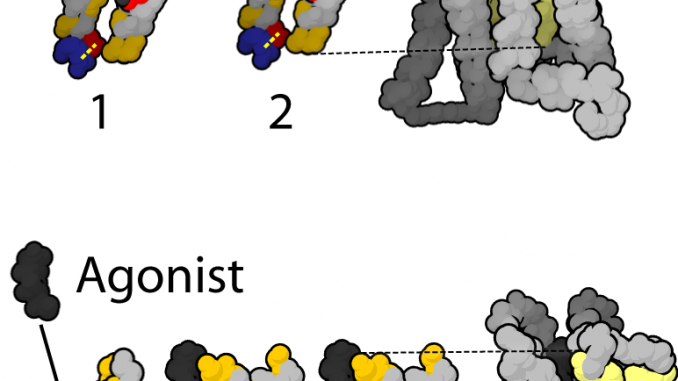
Evidence from animal and human research suggests that the encephalic opioid system is involved in drug addiction. In this study, we recruited 763 unrelated people (465 women, 298 men). Participants filled a 35-item questionnaire on tobacco and alcohol consumption, plus the AUDIT and Fagerström tests, that assess alcohol and tobacco addiction, respectively. A saliva sample was obtained from each participant and all individuals were genotyped for three genetic variants in the Opioid Receptor Mu 1 gene called rs1799971, rs510769 and rs10485057. When the association analysis was performed, we found that the rs10485057 polymorphism was associated with total pure alcohol intake and with the risk of being alcohol consumer in men of our sample. Also, this polymorphism was significantly associated with the Fagerström scores. Rs1799971 had different influence on adaptative and disadaptative patterns of alcohol use. Although the limited sample size, we studied not only extreme phenotypes, but also adaptative, providing a wider vision of the issue.
RESUMEN EN ESPAÑOL
La evidencia de la investigación animal y humana sugiere que el sistema opioide encefálico está implicado en la drogadicción. En este estudio, se reclutaron 763 individuos no relacionados (465 mujeres, 298 hombres). Los participantes cumplimentaron un cuestionario de 35 ítems sobre consumo de tabaco y alcohol, más los tests AUDIT y Fagerström, que evalúan la adicción al alcohol y al tabaco, respectivamente. Se obtuvo una muestra de saliva de cada participante y todos los individuos fueron genotipados para tres variantes genéticas en el receptor Opioid Mu 1 gen denominados rs1799971, rs510769 y rs10485057. Cuando se realizó el análisis de asociación, se encontró que el polimorfismo rs10485057 estaba asociado con la ingesta total de alcohol puro y con el riesgo de ser consumidor de alcohol en los hombres de nuestra muestra. Además, este polimorfismo se asoció significativamente con las puntuaciones del test de Fagerström. Rs1799971 demostró diferentes influencias sobre los patrones adaptativos y desadaptativos del consumo de alcohol. Aunque el tamaño de la muestra era limitado, hemos estudiado no sólo los fenotipos extremos, sino también adaptativo, proporcionando una visión más amplia de la cuestión.
This study was published as:
Francesc Francès, Olga Portolés, Ana Castelló, Jose Antonio Costa, Fernando Verdú. Association between Opioid Receptor mu 1 (OPRM1) Gene Polymorphisms and Tobacco and Alcohol Consumption in a Spanish Population. Bosn J Basic Med Sci 2015;15(2):31-36. DOI: http://dx.doi.org/10.17305/bjbms.2015.243
Leave a Reply